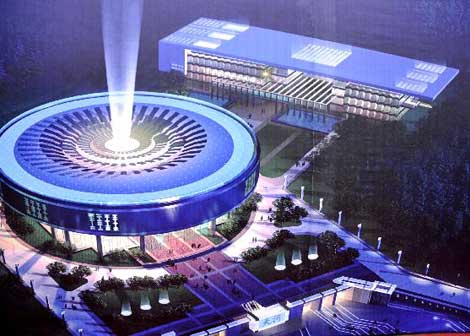
An image of the design for a new supercomputing center in China that will house Tianhe-1A, the top performing system in the recent Top 500 ranking.
China is building a new supercomputing center to house the world's most powerful supercomputer. Officials in Hunan province broke ground Nov. 28 on China's third National Supercomputing Center, which will be located in Changsha and house the Tianhe-1A system, which placed atop the new Top 500 rankings released last month.
The striking new facility joins two existing supercomputing centers located in Tianjin and Shenzhen. Upon completion, the Tianhe-1A at the NSCC in Changsha will be able to provide supercomputing services to support weather forecasting, scientific research, biological pharmaceuticals, animation design and other complex work in central China, said Xu Shousheng, provincial governor of Hunan. "The setting up of the NSCC in Changsha will raise the innovative level of Hunan Province and of central China," said Xu. The system is also expected to support research for the military, as noted by Patrick Thibodeau at ComputerWorld.
The second-generation Tianhe (pronounced “tee-awn-hoo-wa”) system is named after the Milky Way galaxy. A heterogeneous computer, Tianhe-1A uses a proprietary interconnect to couple massively parallel GPUs with multi-core CPUs, enabling significant advantages in performance, size and power. The Tianhe takes advantage of 7,168 NVIDIA Tesla M2050 GPUs, 14,336 CPUs, and 262 Terabytes of distributed memory.
For more on China's progress in supercomputing, see China's Long Climb to the Supercomputing Top at Pingdom. For more on the Changsha project, see coverage at Xinhuanet.




